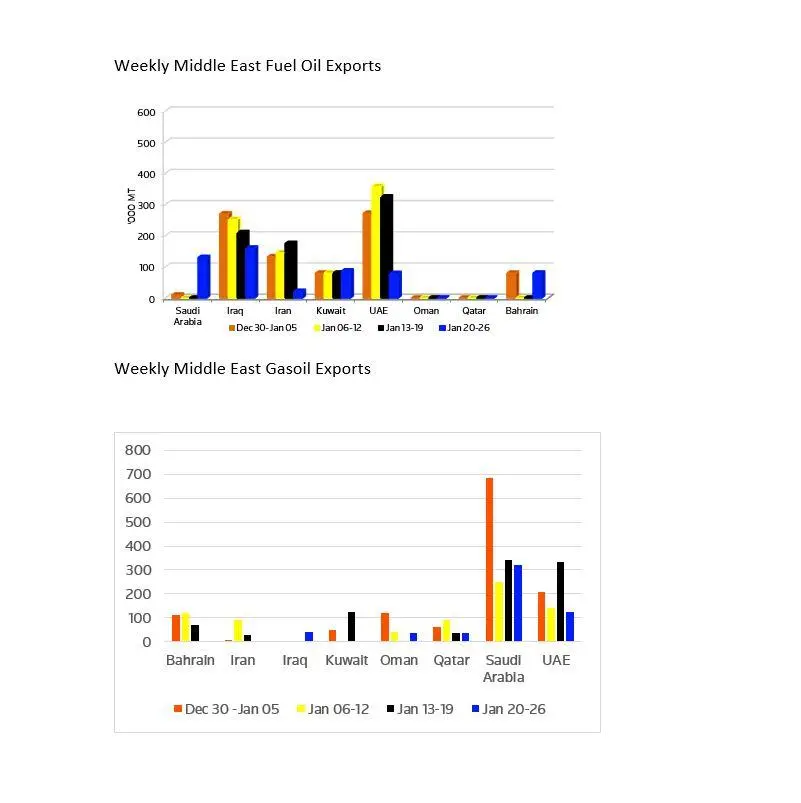PHOTO
The coronavirus deaths have sent oil prices down by more than 10 percent from $66 per barrel, completely negating major events such as the Libyan oil blockade and US sanctions on Iran that would have caused the oil prices to surge.
However, experts say that markets have now largely factored in the setbacks of the outbreak, so prices may begin to settle at higher levels from now on.
The outbreak started at the time of the Chinese New Year celebrations, when oil demand is at its peak in China. But fewer travels could lead to a refined product stock build and could reduce crude oil demand in the future.
"The extension of Chinese New Year holidays will exacerbate the impact. China accounted for almost 50 percent of global demand growth in 2019. As a result, a long epidemic could push demand growth in 2020 to levels well below 1 million bpd," Ehsan Ul Haq, lead analyst, oil research and forecasts at global data provider Refinitiv said.
The coronavirus deaths prompted the markets to conclude a severe reduction in oil prices taking a cue from the previous 2003 SARS outbreak.
The markets absorbed the fact that the virus scare could hit the travel market thereby causing lack of demand for jet fuel, gasoline and diesel, not only in East Asia but worldwide.


A black swan event?
The scare of the virus is so intense that the production outages from Libya totaling 800,000 bpd is yet to take an effect on prices worldwide.
Some analysts have already predicted a demand destruction of around 250,000 bpd, with jet demand falling by almost 200,000 bpd. But this was only initial estimate derived from similar data for SARS.
"The extent of demand destruction will depend on, how long the epidemic lasts. It is likely to have immediate impact on jet fuel and diesel, as Chinese trains are mostly electric or run on diesel. As a result, distillate-rich crudes could be impacted. They are already under pressure due to above-normal temperatures in the Northern Hemisphere and because of lower-than-expected demand for MGO (marine gasoil) following the introduction of new bunker fuel specification at the start of this year," Haq said.
Rakesh Sharma, Senior Oil Analyst from Refinitiv told Zawya: "The various events that would have caused the oil prices to surge has not been factored in due to the scare of coronavirus. For instance, the substantial oil supply disruptions in Libya that happened last week as well as further tightening of sanctions in Iran."
Libya's oil production and exports came to a standstill as General Khalifa Haftar ignored international calls for negotiations and shut off more than half of Libya’s oil exports, and the National Oil Company (NOC) has declared force majeure, taking 800,000 barrels per day of crude offline for export.
Read more here.
Last week, the US Department of Treasury’s Office of Foreign Assets Control OFAC put six entities including two from UAE under sanctions with effect from January 23 for effectively using US dollar transactions with Iran.
"This event has created a panic in the local market which could potentially affect the petroleum products flows in the Arabian Gulf for the near term. " Sharma said.
“It’s surprising that the market is yet to react to combined effect of Libyan Outages and slowdown of Iranian petroleum product exports, which amounts to approximately 200,000 bpd,” he added.
However, prices could see further downside if the death toll would go beyond the 2003 SARS outbreak.
Oil prices today are up by one percent, despite confirmed cases of more than 6000 - an increase of 30 percent from Tuesday's numbers.
‘Very limited impact’
As worries over fast spreading coronavirus have hit financial markets and oil prices, with stocks from Wall Street to Tokyo falling, Saudi Arabia, the biggest oil producer, sees 'very limited impact' on global oil demand.
In a statement carried by official Saudi Press Agency (SPA), Saudi energy minister, Prince Abdulaziz bin Salman said: "The Kingdom is closely monitoring the developments in the global oil market resulting from the gloomy expectations about the impact of the coronavirus outbreak on the Chinese and the global economy and oil market fundamentals."
He said that the current impact on global markets, including oil and other commodities, is primarily driven by psychological factors and extremely negative expectations adopted by some market participants despite its very limited impact on global oil demand.
"Such extreme pessimism occurred back in 2003 during the SARS outbreak though it did not cause a significant reduction in oil demand," the energy minister said, adding, "The Kingdom of Saudi Arabia and other OPEC+ producers have the capability and flexibility needed to respond to any developments, by taking the necessary actions to support oil market stability, if the situation so requires."
(Writing by Seban Scaria seban.scaria@refinitiv.com, editing by Anoop Menon)
Disclaimer: This article is provided for informational purposes only. The content does not provide tax, legal or investment advice or opinion regarding the suitability, value or profitability of any particular security, portfolio or investment strategy. Read our full disclaimer policy here.
© ZAWYA 2020





















